Rural Girls Pursue Soccer Dream, See Possibilities
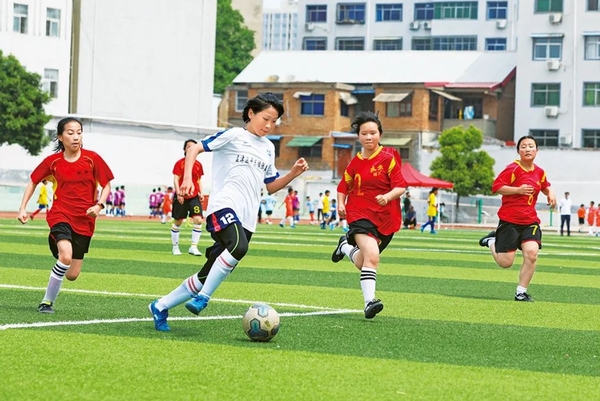
Zhangpan Primary School, in Mengjin, a district in Luoyang, a city in central China's Henan Province, appears to be a typical village school. It has 271 students, and it provides the normal primary school curriculum. However, the school is anything but typical. During the past seven years, the school's girls' soccer team has won 15 championships — in regional and international competitions. Several of the team's players have gone on to become members of the provincial and/or national teams. With their passion for soccer, and especially given their hard training, the rural girls have seen more possibilities in their lives.
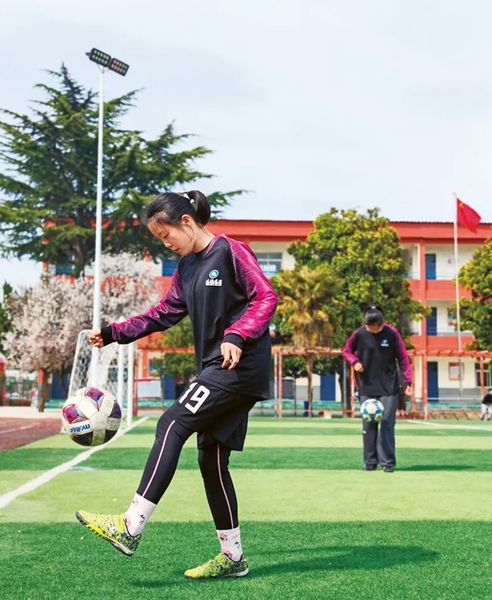
From Scratch
Zhangpan Primary School sits in the corner of Zhangpan. There is a narrow gate to the schoolyard. "The soccer pitch is our luxury," says Song Haibo, principal of the school. Prior to 2015, the school had to share a playground with Zhangpan Junior High School.
Liang Yaowu is a physical education teacher at Zhangpan Primary School. "Many girls in the village have talent for sports," he says. During the 1980s, when Liang was a teacher with Zhangpan Junior High School, some of his students achieved good results in track and field events during the provincial students' games. As a result of their accomplishments, some of those students were enrolled in the municipal or provincial sports schools.
In July 2015, six government departments issued guidelines on accelerating the development of soccer on campus. Liang proposed the school organize soccer training among students, especially girls. Song agreed. Neither Song nor Liang knew much about soccer, so they had to start from scratch, including learning the basics of the game. They led students in physical-ability training while they studied — by watching videos — the rules and basic movements involved in soccer.
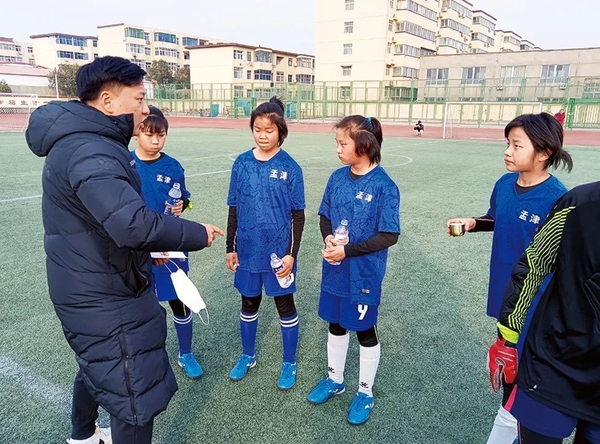
In 2016, the girls' soccer team competed in a town-level competition — and finished second. "Our players had good physical abilities, but they lacked professional skills. We realized we had to employ professionals to train the players," Song recalls. Song asked Li Lei, a former national college students' soccer league player, and founder of a youth soccer club in Luoyang, to coach the school's team. In May 2017, the school's soccer office was founded. Song headed the office, and Liang and Li were co-coaches. Zhang Canbo, the school's director of general affairs, was responsible for logistical support.
Since then, the team's players have practiced soccer two hours every day after school. "The conditions for training were tough. The players had no uniforms, and they trained on concrete. But they never complained," Li recalls.
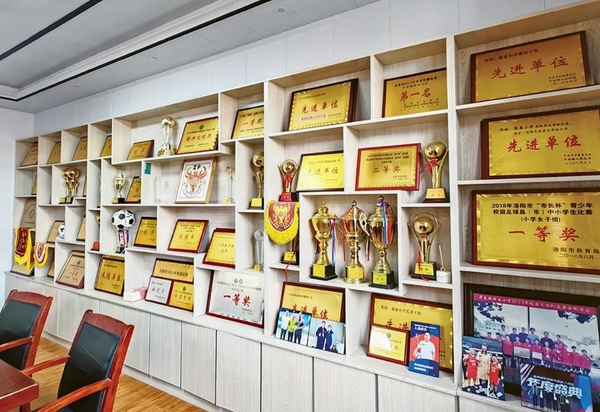
Championships
The team had 12 players prior to summer vacation in 2017. Song and the coaching staff had a hard time keeping players on the team. "Many parents believed academic performance was the most important thing for their children. It was understandable that they didn't want their children to put too much effort into soccer," Liang says.
To persuade parents to allow their children to play soccer, Song organized three meetings with parents. "We learned the students who participated in soccer training had better academic performances, and they were more outgoing. For those who had talent in soccer, they could also apply to be special sports talent when they applied for higher education," Song told the parents. He also explained soccer could broaden the students' visions when they attended matches in other places, and he promised the school would arrange for teachers to help the players with their studies on weekends.
Liang Mengyan, then a fourth grader, loved soccer. After she joined the team, her academic performance improved. Her mother, who had been hesitant to let her play soccer, allowed her to remain on the team. In October 2017, the team competed in a county-level youth soccer match. Although it was the first time the team competed in the event, and despite the fact most of players had only trained for a few months, the team went undefeated to win the championship. In 2018, they repeated as champions.
In November 2018, with financial support from local governments (the town and district), a soccer pitch was built at Zhangpan Primary School. The students were excited when they saw the beautiful pitch for the first time.
Attending the Belt and Road youth soccer winter camp and tournament, in north China's Inner Mongolia Autonomous Region, in 2019 was one of the most unforgettable events for the players. Why? Because the team almost didn't make it to the event. Song wanted the team to participate in the international event, but the school couldn't afford the transportation and accommodation costs. Thanks to the financial support from the event's organizers, and the education and sports bureau of Mengjin, the team was able to attend. Li's wife, a doctor, traveled with the team to take care of the players.
During the event's opening ceremony, the players on the other teams wore team jackets and cleats. The players from Zhangpan wore their own jackets — in various colors — and canvas sneakers. Nonetheless, the team beat each of its 15 opponents, including the teams from both Mongolia and Russia, and only suffered one goal against, to win the championship of the under-12 category. Song says that is the most valuable championship the team has won.
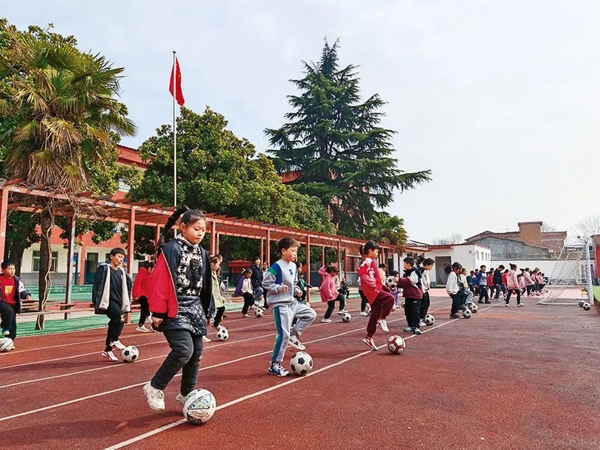
Way Out
Given the team's outstanding performance, China's Ministry of Education designated Zhangpan Primary School a national school with a soccer program in its curriculum. "Soccer has taught the students there are always failures and frustrations in life. The most important thing is realizing the causes of your failure, and then continuing to work hard," Song says.
Song and the players are unlikely to ever forget the final of the 2019 Governor's Cup (provincial) match. The players had trained hard for the tournament, and they had not encountered any serious difficulties in their matches, as they beat all of their opponents on the way to the final. "We had thought we would definitely win the championship, and we even had prepared for a celebratory dinner. More than 100 villagers of Zhangpan came to the stadium to cheer for the team during the final," Song recalls. It was not to be. To everyone's disappointment, the team lost the match. The players cried.
Despite that failure, the players' talents and hard work were recognized. Of that team's former players, Liang Jiaqi joined Fujian's provincial team, and Song Jiaqi, a national first-class athlete, and Wang Yihao joined Jiangxi's provincial teams. Other members of that team enrolled in a key junior high school in Luoyang. Wang joined the school's team when she was a third grader. Wang Huzhan, her father, has said he wanted her to learn to dance rather than play soccer. Wang Yihao insisted she wanted to play soccer. "She even continued practicing, under the street light in the evening, after she finished training at school," Wang Huzhan says. He was touched by his daughter's passion.
Wang Yihao soon became one of the team's key players. Wang Huzhan often watched her matches, from a far corner of the pitch, without letting her know. "I was afraid she would be nervous if she saw me," he says.
Yuan Jiaxin, a sixth grader who loves soccer, transferred into the school a year ago. She joined the team, and her skills quickly improved. "I want to be a professional player, and I want to play in the World Cup as a member of the national team," she says. Of the players who graduated from Zhangpan Primary School during the past five years, five have been recognized as national first-class athletes, and seven have been recognized as national second-class athletes.
"It still is not easy for rural girls to change their fates by playing soccer," Song says. The school's team now has 26 players, from different grades; unfortunately, that is not optimum for the coaches to select a competitive lineup for matches.
Liang Yaowu has created a "soccer exercise," which involves basic movements often used in matches. Every day, during their break, all of the students in Zhangpan Primary School, each with a ball, perform the exercise. "Soccer is an ideal way to prevent obesity and depression. It also helps children learn about goals, rules and cooperation," Song says. Now, every student has a chance to play, for their classes, in the school's soccer league. The school's officials negotiated a cooperation agreement with a sports school affiliated with a university in Luoyang. Students majoring in soccer at the sports school will help train students attending Zhangpan Primary School.
In March, the State General Administration of Sport, and 11 other departments, issued the Implementation Guidelines on the Reform and Development of Chinese Youth Soccer. During an inspection tour, from March 30 to April 2, State Councilor Shen Yiqin visited schools and soccer training bases in central China's Hubei Province and east China's Jiangxi Province. During her tour, she said efforts should be made to establish youth soccer training systems in pilot areas, especially in western China, with the goal of cultivating more soccer talents. She also called for improvements to youth soccer competition systems.
Song agrees. "We hope every child will grow up healthily and happily, and we hope those who love playing soccer will have more opportunities on their way ahead," he says.
Photos from Han Yacong and Interviewees
Source: China Women's News
(Women of China English Monthly June 2024)
Editor: Wang Shasha
Please understand that womenofchina.cn,a non-profit, information-communication website, cannot reach every writer before using articles and images. For copyright issues, please contact us by emailing: website@womenofchina.cn. The articles published and opinions expressed on this website represent the opinions of writers and are not necessarily shared by womenofchina.cn.








.jpg)

 WeChat
WeChat Weibo
Weibo 京公网安备 11010102004314号
京公网安备 11010102004314号